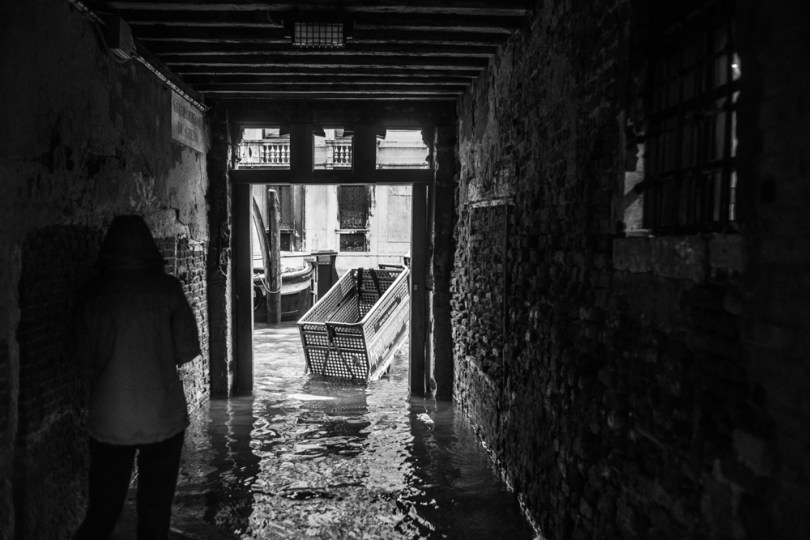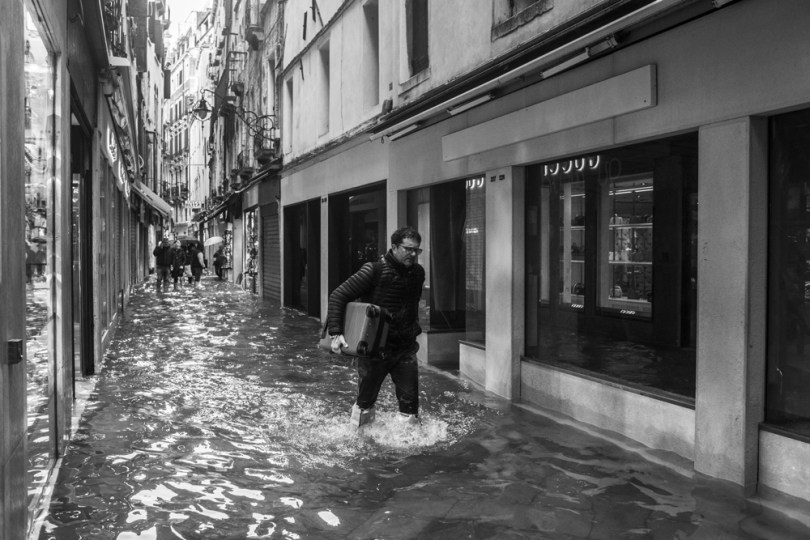Tides are a natural phenomenon, Venetian people know it so well that they even coined their own term to describe it – “acqua alta” – and learned to live with it. Locals got used to high tides and started to deal with them as a small nuisance compared to the privilege of waking up in Venice every day: they learned to bring rubber boots with them; people living on the ground floors move every object from the ground to the highest shelves as soon as an exceptional acqua alta is forecasted; they learned to be ahead of natural elements, taking in supplies in advance to hold on, waiting for the shops to open and the ATMs to function again.

One must give them credit both for their resilience and their sense of humor: old women walking in water high to their knees to get their newspaper – try to stop them and you will get told off with words your mother would have you wash your mouth to even dare thinking them -.
Wandering in Venice you could find people having a drink sitting on stools placed in water; I still remember seeing a grand piano with four rubber boots on its wooden legs. Venetians are unstoppable certainly these days showed it well.
The naturalness locals were able to fake was bought by tourists who began to look at this annoying ordinary event as a charming eccentricity. So next to a resident trying to assess the damages suffered by his home, you might find someone idiotically smiling and taking a photo enjoying acqua alta as a novelty; sometimes karma strikes and, thanks to a number of factors such as the water cloudiness or general lack of attention, you see people fall into canals while taking selfies.

It is almost been a week since the acqua alta reached 187 cm, a level only surpassed one time in 1966 when the water level got to 194 cm. There is still not a precise esteem of the economical loss endured by private citizens, what is certain is that the damages suffered by Venice are the toll taken by an endlessly-growing tidal wave of corruption: since the very beginning of the planning phase, Mose has always been a local joke; other nations – such as Holland and France – “laughed” at the project, pointing out so many levels of criticality in the project that it is quite surprising that there are still people that today are defending the chance for it to properly function, just to mention the two most obvious ones: rising sea levels, the astronomical managing fees eroding the economical management costs that a city like Venice requires.
In the meantime, not only the city is fighting against the slime left by the tide on monuments, but it is in the middle of a political debate which filth is far more repulsive: Italian credibility is once again wavered by the obvious nth mismanagement of public funds and its late assessment timing.
While salt corrupts invaluable and unique Art, Venetians are still cleaning their flooded houses. Group of organised-volunteers decided to help people in need, not to mention the help offered to binmen whose small number was not enough to provide a prompt answer everywhere on the Island.

The city is resisting as it can, thanks to the resilience of its great devotees, but trying to keep a positive mind-set is hard: a millennia-long history is endangered by a decade of ineptitude.
Once Venice will be forever gone, will it become a cautionary tale we tell children? Out of striking-banality will people compare it to Atlantis? When nothing will be left of it – nor its invaluable beauty nor its unrivaled charm – will we remember this event as the day that forewarned the moment when the Adriatic submerged the Queen of the Sea?


As a kid I remember being scared of losing the people I loved; sometimes the thought was so tormenting that it would keep me awake at night, therefore I would spend those sleepless hours recalling the purest moments I had the chance of spending with my family and friends, eventually sleep would win. At my awakening I would hug my mother a little closer, trying to impress every instant in my memory.
Growing up the concept of loss becomes more familiar: you learn to embrace it, leaving it as little space in your mind as you can. Now, more than ever, the memory of those wakeful nights is hunting me as I stand powerless, watching the city I love engulfed by these dark waters.
To read other reportages click, here.
Follow @positive_mag on twitter for the last updates https://www.positive-magazine.com/venice-the-sinking-belle/

